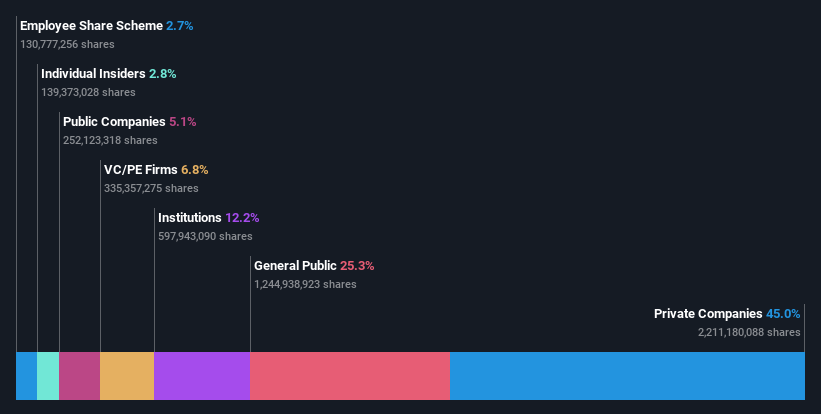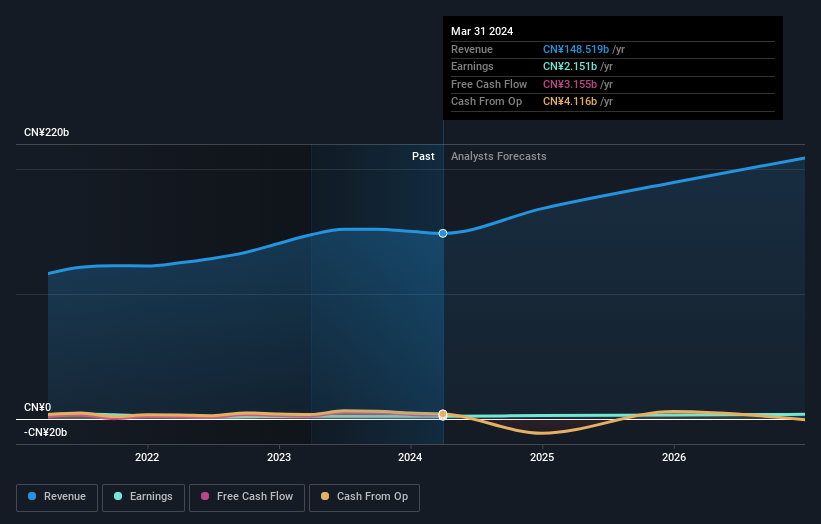- China
- /
- Healthcare Services
- /
- SHSE:600998
Private companies invested in Jointown Pharmaceutical Group Co., Ltd (SHSE:600998) copped the brunt of last week's CN¥933m market cap decline

Key Insights
- Significant control over Jointown Pharmaceutical Group by private companies implies that the general public has more power to influence management and governance-related decisions
- The top 3 shareholders own 52% of the company
- 12% of Jointown Pharmaceutical Group is held by Institutions
If you want to know who really controls Jointown Pharmaceutical Group Co., Ltd (SHSE:600998), then you'll have to look at the makeup of its share registry. With 45% stake, private companies possess the maximum shares in the company. In other words, the group stands to gain the most (or lose the most) from their investment into the company.
As market cap fell to CN¥24b last week, private companies would have faced the highest losses than any other shareholder groups of the company.
Let's take a closer look to see what the different types of shareholders can tell us about Jointown Pharmaceutical Group.
See our latest analysis for Jointown Pharmaceutical Group

What Does The Institutional Ownership Tell Us About Jointown Pharmaceutical Group?
Institutions typically measure themselves against a benchmark when reporting to their own investors, so they often become more enthusiastic about a stock once it's included in a major index. We would expect most companies to have some institutions on the register, especially if they are growing.
We can see that Jointown Pharmaceutical Group does have institutional investors; and they hold a good portion of the company's stock. This can indicate that the company has a certain degree of credibility in the investment community. However, it is best to be wary of relying on the supposed validation that comes with institutional investors. They too, get it wrong sometimes. If multiple institutions change their view on a stock at the same time, you could see the share price drop fast. It's therefore worth looking at Jointown Pharmaceutical Group's earnings history below. Of course, the future is what really matters.

We note that hedge funds don't have a meaningful investment in Jointown Pharmaceutical Group. The company's largest shareholder is Chuchang Investment Group Co.,Ltd., with ownership of 33%. Meanwhile, the second and third largest shareholders, hold 12% and 6.8%, of the shares outstanding, respectively.
A more detailed study of the shareholder registry showed us that 3 of the top shareholders have a considerable amount of ownership in the company, via their 52% stake.
While studying institutional ownership for a company can add value to your research, it is also a good practice to research analyst recommendations to get a deeper understand of a stock's expected performance. Quite a few analysts cover the stock, so you could look into forecast growth quite easily.
Insider Ownership Of Jointown Pharmaceutical Group
While the precise definition of an insider can be subjective, almost everyone considers board members to be insiders. Management ultimately answers to the board. However, it is not uncommon for managers to be executive board members, especially if they are a founder or the CEO.
Most consider insider ownership a positive because it can indicate the board is well aligned with other shareholders. However, on some occasions too much power is concentrated within this group.
We can see that insiders own shares in Jointown Pharmaceutical Group Co., Ltd. It is a pretty big company, so it is generally a positive to see some potentially meaningful alignment. In this case, they own around CN¥694m worth of shares (at current prices). If you would like to explore the question of insider alignment, you can click here to see if insiders have been buying or selling.
General Public Ownership
With a 25% ownership, the general public, mostly comprising of individual investors, have some degree of sway over Jointown Pharmaceutical Group. While this group can't necessarily call the shots, it can certainly have a real influence on how the company is run.
Private Equity Ownership
With a stake of 6.8%, private equity firms could influence the Jointown Pharmaceutical Group board. Some might like this, because private equity are sometimes activists who hold management accountable. But other times, private equity is selling out, having taking the company public.
Private Company Ownership
It seems that Private Companies own 45%, of the Jointown Pharmaceutical Group stock. Private companies may be related parties. Sometimes insiders have an interest in a public company through a holding in a private company, rather than in their own capacity as an individual. While it's hard to draw any broad stroke conclusions, it is worth noting as an area for further research.
Public Company Ownership
We can see that public companies hold 5.1% of the Jointown Pharmaceutical Group shares on issue. It's hard to say for sure but this suggests they have entwined business interests. This might be a strategic stake, so it's worth watching this space for changes in ownership.
Next Steps:
While it is well worth considering the different groups that own a company, there are other factors that are even more important. For example, we've discovered 1 warning sign for Jointown Pharmaceutical Group that you should be aware of before investing here.
If you are like me, you may want to think about whether this company will grow or shrink. Luckily, you can check this free report showing analyst forecasts for its future.
NB: Figures in this article are calculated using data from the last twelve months, which refer to the 12-month period ending on the last date of the month the financial statement is dated. This may not be consistent with full year annual report figures.
New: Manage All Your Stock Portfolios in One Place
We've created the ultimate portfolio companion for stock investors, and it's free.
• Connect an unlimited number of Portfolios and see your total in one currency
• Be alerted to new Warning Signs or Risks via email or mobile
• Track the Fair Value of your stocks
Have feedback on this article? Concerned about the content? Get in touch with us directly. Alternatively, email editorial-team (at) simplywallst.com.
This article by Simply Wall St is general in nature. We provide commentary based on historical data and analyst forecasts only using an unbiased methodology and our articles are not intended to be financial advice. It does not constitute a recommendation to buy or sell any stock, and does not take account of your objectives, or your financial situation. We aim to bring you long-term focused analysis driven by fundamental data. Note that our analysis may not factor in the latest price-sensitive company announcements or qualitative material. Simply Wall St has no position in any stocks mentioned.
Have feedback on this article? Concerned about the content? Get in touch with us directly. Alternatively, email editorial-team@simplywallst.com
About SHSE:600998
Jointown Pharmaceutical Group
Provides pharmaceutical supply chain services in China.
Excellent balance sheet, good value and pays a dividend.


